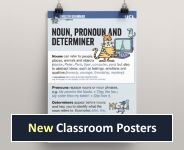Investigating language: project ideas
This page includes a numbers of ideas and suggestions for your students' independent language study. We have categorised them by 'language levels', but only for navigation purposes - don't let the categories limit your students' creativity!
Meaning
»
- Printer-friendly version
- Log in to view or leave comments


